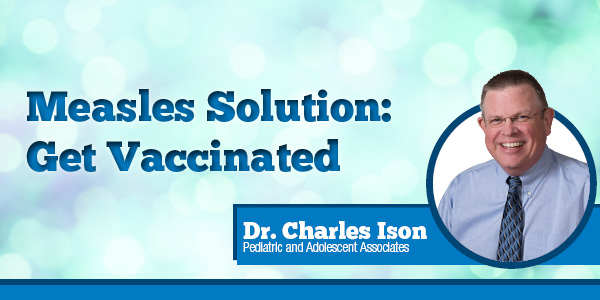Measles Solution: Get Vaccinated
When I was 13 years old, I was hospitalized for pneumonia. A young boy was soon moved into the other bed in the room. He had a high fever and hardly moved except to groan.
I thought that I might see him die in front of me. He later broke out in a flat, red rash. Thankfully, he recovered from what turned out to be the measles virus.
Few illnesses are as contagious as measles. The virus can hang in the air in a room long after a contagious person has left it.
It takes 1-2 weeks for an infected person to show signs of having it. The first signs are a high fever, runny nose, a cough, and watery, red eyes. White spots in the mouth appear 2-3 days later. Soon after, a flat, red rash starts on the head and then spreads to the rest of the body.
About 10% of those with measles will get an ear infection that can lead to permanent hearing loss.
One in 10 can have diarrhea, and 5% get pneumonia. Brain swelling (encephalitis), which can lead to permanent brain damage occurs in 0.1% of cases. Of those who catch measles, 0.1%-0.2% die from it.
The first vaccine against measles was licensed in the U.S. in 1963. Before then, 90% of all children caught measles by the age of 15.
The virus caused about 500 deaths per year. By the late 1960s, measles cases had fallen by 99%.
In 2000, measles was declared eliminated in the U.S. All the cases reported here came from elsewhere. Nobody caught it from others here.
The MMR (measles-mumps-rubella) vaccine was widely given here. While it could sometimes cause a high fever and a rash, severe reactions to it were extremely low.
The British medical journal, “The Lancet,” published a paper by the physician Andrew Wakefield that purported to show a link between the MMR vaccine and autism in children.
Although the journal later retracted the paper for being fraudulent and Andrew Wakefield lost his medical license in the U.K., the damage had been done.
His actions led to a decrease in MMR vaccine use in Europe and the U.S., and to the subsequent increase in measles cases. Some children have even died.
The MMR vaccine is very effective protection against measles. It has scientifically been shown numerous times not to cause autism in children.
So far in 2019, there have been 839 cases of measles in the U.S. That is unacceptable, and could be avoided if all eligible U.S. children were vaccinated.
Dr. Charles Ison is a University of Kentucky graduate who has practiced in his hometown of Lexington since 1993. He is a partner in Pediatric and Adolescent Associates.

